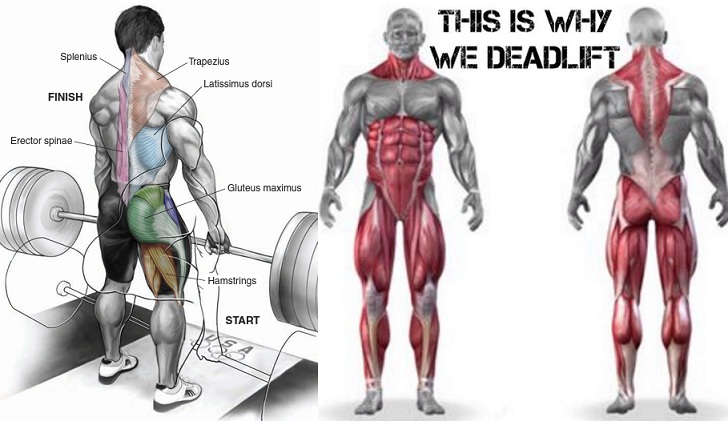After the squat, the deadlift is the most effective movement that you can do in the gym. Epitomizing the term “compound movement,” it uses nearly every muscle in your entire body, from your traps all the way down to your calves. Bodybuilders, competitive lifters, and many other athletes have long used this movement to build brute strength, pack on muscle mass, and improve their overall athletic performance. Here are five reasons why every trainee, casual or competitive, should be deadlifting:

1. The Deadlift Promotes Full Body Muscular Development
While many trainers and trainees alike are quick to simply categorize the deadlift as a “back” movement, it is truly a full-body exercise. At the start, the deadlift brings the hamstrings and quads into play to break the weight from the floor. The lower back is also stimulated from the very beginning and remains tense and contracted to keep the weight moving upward and back. From the middle of the range of motion to lockout, the lats, traps, and rhomboids are heavily engaged to keep the weight in close to the body. Finally, the forearms, biceps, and overall grip strength are taxed to the limit to hold on to heavy weights.
2. Building the Biggest Back Possible
While the deadlift brings much more than the lower and upper backs into play, it is truly the best back-builder you can perform. It is indispensable for obtaining that thick look to your back and overall physique that simply screams “powerful.” At powerlifting meets, the guys with the biggest deadlifts are almost always sporting the biggest, thickest lats and traps. In bodybuilding shows, the competitors with the most dominating back poses are also usually the ones known to be strong deadlifters. Pull-ups and rows are certainly important, but you will never build the most developed back possible without the deadlift.
3. Developing an Iron Grip
Unless you are using lifting straps, the deadlift will develop enormous crushing and pinching grip strength. Your forearms and hands grow in strength and size to accommodate the weights that the rest of your body is handling. This improved grip strength is valuable not only for other weight-training exercises, but for any sport in which you grab, hold, or throw objects or other competitors. Because your hands are the tools for transferring power from the rest of your body to another object, your grip can make or break your overall strength.
4. The Deadlift Mimics Real-Life and Sport Situations
While people are quick to toss around the term “functional strength” with little real meaning, it surely applies to the deadlift. The foremost example of this application to real-life scenarios is in picking things up off the ground, especially heavy objects that require a strong back and grip. Furthermore, nearly every contact sport contains situations such as checking, tackling, and jumping that involve a large, quick transference of energy from the lower body to the upper body or another object.
5. A Great Workout for Your Abs
Just as with any exercise that strongly involves the lower back, the deadlift heavily taxes the abdominals and obliques, as well. These muscles tense and tighten during the movement to help keep the lower back contracted in an arched position. If you have never deadlifted before, your first few sessions may very well leave your abs more sore than any targeted abdominal workout you have ever done.
To conclude, every weight trainee should be performing the deadlift regularly. It is one of the best movements for building overall strength and muscle mass, as well as for improving everyday and sport-specific performance. If you are not performing this movement, you are not realizing your full muscle building potential.
